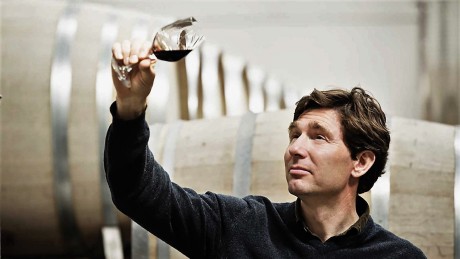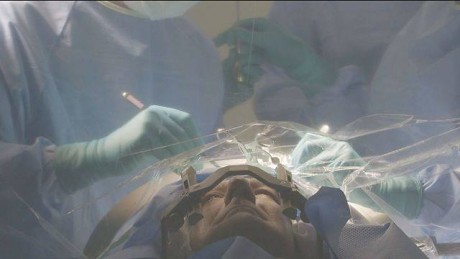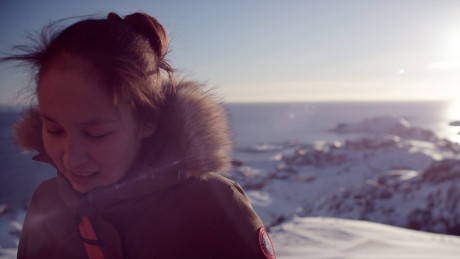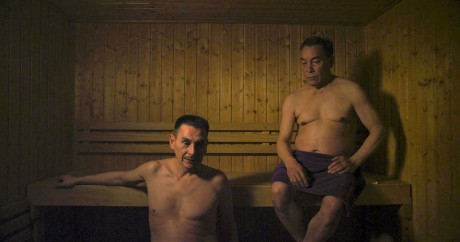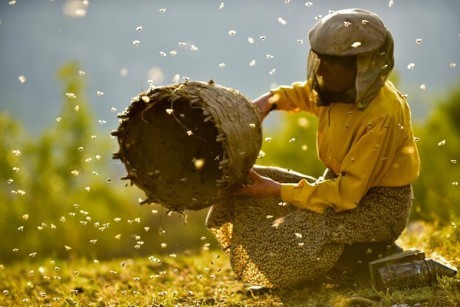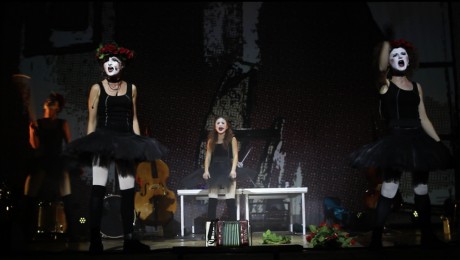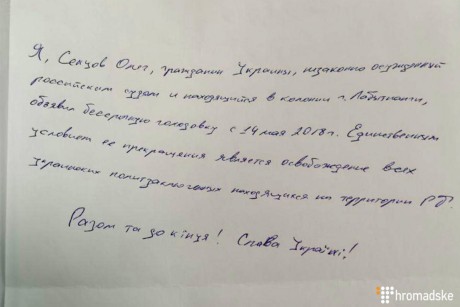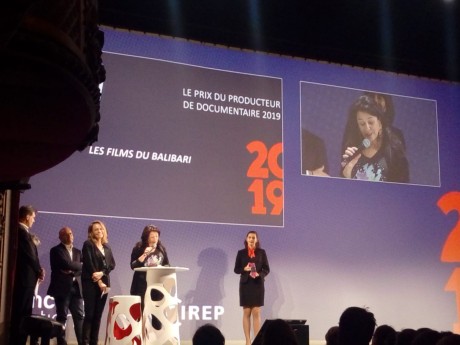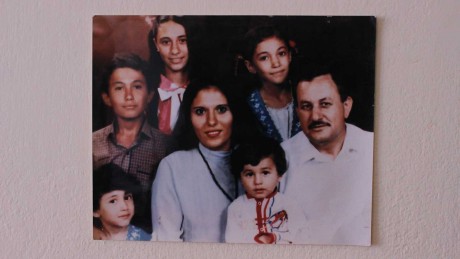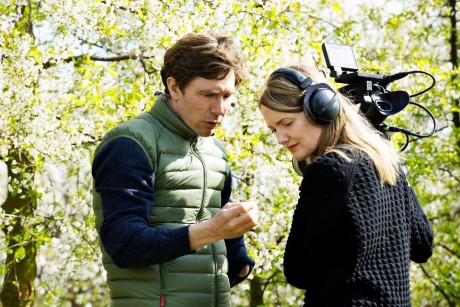KIRSEBÆREVENTYRET (2019)
Eva Mulvad har atter en gang lavet en smuk og tydelig film om et moderne menneske. Han er godsejer, han hedder Harald Krabbe, han har et projekt ved siden af gårdens grundlæggende landbrugsproduktion, han vil optimere de mange kirsebærtræers udbytte, lave fornem vin i stedet for almindelig marmelade. Eva Mulvad vil skildre udvidelsen og fornyelsen, forsøget. De er energiske mennesker de to, de klæder hinanden de to.
Hvor kommer det overskud fra? Jeg tror det kommer fra elegancen – det elegante menneskes sikkerhed, det sikre professionelle greb, som igen kommer af en ubøjelig tro på det sikre valg.
Om kirsebæreventyret lykkes fortæller filmen i den tilbageholdte videns form, det udvikler sig til en thriller, jeg sidder og frygter tilbagegang, uheld, nemesis, dramaturgiens vendepunkt. Hvordan er det nu med eventyr? Det betyder jo i grunden det som vil komme. Jeg tænker på violinisten i instruktørens forrige film, tænker på godsejeren i denne, Eva Mulvad har atter skrevet et tidens dokument, denne gang om det nye modernes elegance, skrevet så klogt og klart om det som vil komme.
Danmark 2018, 85 min.
STILL: Kirsebæreventyret, Harald Krabbe og Eva Mulvad.
A MODERN MAN (2019)

Moderne har jo både at gøre med modernus (ny, nyere) og med modus (måde), og denne dobbelthed får den præcise titel til pege på et menneske med nye måder at være på, måske være til i virkeligheden på, leve sit liv på, sortere sine valg på. Jeg opfatter det sådan, at Eva Mulvad vil undersøge det nye moderne. Måske vil hun også som filmskaber i naturlig forlængelse lægge en ny slags film til fænomenerne, hun skildrer i A Modern Man, en ny moderne filmisk stil, hvor det karakteristiske er, at filmen løsnet af den litterære episke fremadskriden, løsnet af journalistikkens opklaringsdrama fungerer på gamle cinematografiske betingelser som at stille scene ved scene. Og der er er i Mulvads film sandelig lange og tydelige og selvbevidste scener bygget af lange rolige optagelser af enkeltafsnit i Charlie Siems liv.
Charlie Siem er violinist og fotomodel, og det på verdensplan, en mondæn mand, som medvirker som en populær stjerne i samtaleshows i tv i samtaler om offentligheden, omsværmelsen og i dette ensomheden. Facebook og Instagram er medierne, men forbilledet er Robert De Niro.
Første afsnit, filmens åbning, er mangetydig. Den skildrer købet af en ny, rød Porsche. Reklamefilm eller dokumentarfilm? Køber han eller er han model? Pointen er, at han spørger sælgeren: Hvordan er dens lyd? Prøver motorlyden af som en musiker et instrument, og så vil han i en æstetisk ideosynkrasi have et underlødigt designet typenavn mærke fjernet fra bagklappen. Detaljen er vigtig.
Så følger en scene fra en koncert. Siem er alene foran orkesteret, spiller kadancen, som er vanskelig, kun violinen høres, en nåls fald kunne høres. Den virtuose kadance afbrydes, det her handler ikke om fordybelse, så der klippes til et voldsomt hovedspring fra højt oppe ned i havet, derfra til et stille svømmebassin uden person, en smuk ensom arkitektur, derfra til en scene med Siem i et soveværelse, han pakker vitaminpiller ud. Den moderne mand passer sin krop. Og sin skrædder.
Han er model for Hugo Boss og for Martell cognac: en scene fra en reception for vel et nyt mærke. Og så en scene fra fotomodellens helt private almindelige 30 års fødselsdag. Det er spændvidden.
Han køber et flygel, eller gør han? Eller er han model i en film for fabrikanten? Eva Mulvads billede kan bruges til begge formål, hendes fascination og interesse har begge disse filmiske blik på hændelsen. Flyglet bakses op af robuste flyttemænd med beskyttelseshandsker, oppe på plads i hjørneværelset stilles instrumentet med et støn, og det åbnes efter at være udsat for strabadserne, en af mændene slår sine behandskede fingre i tangenterne. Det virker! Siger han med et charmerende smil. Pointen er der brug for, både i reklamefilmen og i dokumentarfilmen. I Adam Nielsens klip. En lille fryd.
Scenerne stiller Adam Nielsen i en rolig, tydelig række, så de belyser hinanden, bliver til denne gamle fortælling af billeder: animeret natklubscene i sort/hvid, stilfærdig scene med søsteren, de øver sammen i en varm og hyggelig hytte, hun viser med sin karakter noget, der ellers er fremmed i filmen, en intellektuel, følsom natur. Restaurantscenen er også ægte og éntydig, Siem er sammen med en uundværlig, meget livligt talende kvinde med en dyb stemme og sin pianist Itamar Golan, som også er meget til stede. Det er film, det her! Tænker jeg, hun er god, pianisten er fin. Scenen med massage hos fysioterapeuten er spændt til grænsen af det udholdelige, til lige før, tæer krummes. Massørens kommentarer er vidtløftige, en slags følelsesanalyse, en tolkning af hovedpersonen, modellen og violinisten med den glatte kontrollerede kølige noget fattige udstråling. Og med den store monolog lige efter vokser filmen, noterer jeg det sted i story-line, ja, filmen vokser og vokser hele vejen mod et helstøbt og beslutsomt værk. Og idet jeg indser det, kommer min belønning, violinistens og pianistens morgenbad i havet, violinisten sportstrænet, frisk, pianisten tøvende, frysende, ængstelig. Det er herligt, det er jo Don Juan og Leporello, det er Don Quichotte og Sancho Panza. En vild koncert for violin og orkester afslutter filmen, og omsider fortsætter musikken til den er slut og dør med de sidste credits.
Eva Mulvad skildrer en fascination, det er værkets kerne og styrke. En fascination af de materielle tings skønhed som hos Tom Ford i hans meget beslægtede film A Single Man, 2009 med dens fejlfrie setdesign. I Fords film er det en anden tid, og fascinationen gælder en fejlfri scenografi som ramme om tragedien at miste sin elskede, men det i en tid, i begyndelsen af 1960’erne, hvor at leve alene var det nye moderne. Filmens anden styrke er pianisten, Itamar Golan, som er den nødvendige Leporello / Sancho Panza / den kloge klovn. Han har den filmkarakterens totale udstråling, som Charlie Siem mangler. En hviskende samtale mellem de to er et fint skildret højdepunkt.
Svagheden er, at der faktisk ingenting er om musikken, om Siems særegne tolkning, og hans spil kommer så også til at danne en overflade af virtuose detaljer, som er teknik, men som det skildres uden egentlig forståelse. Fokus er, som hos Jørgen Leth et studium af overflade, Det perfekte menneske falder selvfølgelig i tanken. Er der her som der flere lag, har Eva Mulvad også flere lag? Scenen med søsteren i hytten måske? En smerte i et ansigtstræk måske? En tvivl midt i dette perfekte?
Det nye moderne filmklip er langsomhed og fravær af angst for pause og tomhed, den nye moderne cinematografi er optagethed af øjeblikket, er ønsket om at vide det ud. Hvor det lige før var afviklingen af øjeblikket, opløsningen af nuet i en hurtig strøm af meget korte klip, som dominerede det moderne. Den røde Porsche er en hurtig bil, den kører hurtigt i potente gearskift med helten, eller er det fotomodellen? ved rattet. Hurtigt i det stort tegnede dramatiske landskab. Men i optagelsen oppefra er scenen langsom og lang og fascinationen gælder den lille smukke bil i landskabet, gælder det hurtige i det langsomme, altså detaljen som for eksempel hos Tom Ford, mere end overfladen som for eksempel hos Jørgen Leth. Kunst laves ikke på virkeligheden, sagde Per Højholt, kunst laves på kunst. Sådan måske også filmkunst, dokument ved dokument. Eva Mulvad har skrevet et tidens dokument om det nye moderne.
VORES LYKKES FJENDER (2006)
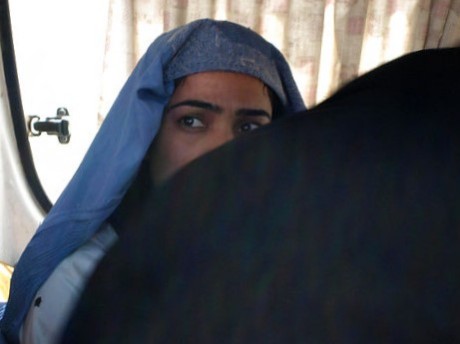
Optagelserne fra Afghanistan alene var ikke nok til at skildre Malalai Joyas angst. Rent objektivt formåede de ikke at fortælle, at hun lever i konstant livsfare. ”Det så ikke særlig farligt ud”, fortæller Adam Nielsen, som har klippet filmen.
Men musikken kunne vise det, man ikke kan se, sammen med optagelsernes billede og lyd kunne den genskabe instruktørens sansning på location. Musikken fuldstændiggjorde simpelt hen den dokumentariske hensigt. Genskabte stedets virkelighed, siger filmens klipper Adam Nielsen, og syreprøven er for ham instruktørens fornemmelse af kongruens. Og, må man herefter tro, sådan var det for Malalai Joya dagene før valget, hvor instruktøren og kameraet fulgte hende. Hvad man ser er manipuleret til autenticitet.
Det begynder med arkivstof, i en journalistisk reportage, Malalai Joyas berømte tale to år tidligere end filmens tid, 100 prc., som mod slutningen mixes medmusikken, et langsomt og alvorligt orkestermotiv, én unison tone, som leder over i filmens første scene, Malalai Joyas midlertidige opholdssted, hun fortæller, at hun må et andet sted hen. Hendes meget neddæmpede uro bliver til scenens autentiske angstfyldte nervøsitet ved at strygermotivet blandes med dialogen og dæmpes, for at stige igen ved scenens slutning, hvor hun og hjælperne er på vej ud, og der klippes til titelskiltet Vores lykkes fjender, og man er på det rene med dette værks tone af usentimental alvor.
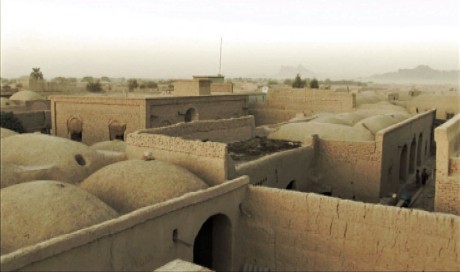
Korte landskabsscener, den smukke by Farah bliver et intermezzo med bylyd og muezzinens råb over tagene før næste scene. Hun hører radio, skriver notater. Vi ser rummene. Telefonen ringer, hun taler med en journalist, og vi forstår via en tolk. Det handler om intimideringer og attentatforsøg. Fire gange har hun overlevet. Musikken, langsomme og alvorlige orkesterstemmer stiger dramatisk så det underspillet nøgterne i dialogen løftes til det eksistentielle niveau, som er følelsens autentiske sted. For hjertet hamrer.
Næste scene, et møde med en gammel mand, som vil stemme på hende, understreger at lyden af dialogen ikke er gået tabt, og den afløses så, da han går af et nyt motiv. Igen et intermezzo- eller ”flytte”tema, som blander sig i følgende scenes optagne lyd af gadestøj og ophidset dialog under agitationsarbejde. Dialogen ren dominerer nu en lang scene med et valgmøde, og vi ved at det efterfølgende intermezzo med landskabsbillede, hvor en galende hane leverer lyden fører over i en ny scene med dialog. Det er blevet konsensus: scene, flytning, scene, flytning, hver gang sat stemningsmæssigt på plads ved musikken, som nu efter en scene med en gammel kvinde, som har tilintetgjort en kampvogn, etablerer en flytning af sted ved guitarakkorder til aftenbilleder i gaderne til en scene, hvor hun (guitaren fastholder autenticiteten) ordner hår foran et spejl og hører igen radio. Hver flytning har åbenbart sit motiv som medskaber forståelsen af scenen. Som så tydeligt ved den sidste i afsnittet, som er forberedelse til en rejse til en landsby.
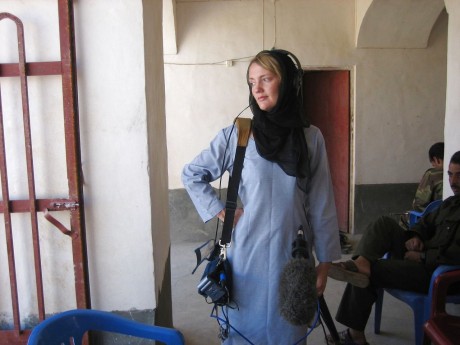
Sikkerhedschefen kommer og soldaterne og våbnene og bilerne, og vi er nu tilbage ved den foruroligende brummen på én tone i orkesteret, som minder os om filmens begyndelse i angst. Hele denne fortælling er altså medskabt af filmmusikken, som dialogens klarhed har givet mening.
DEN SIDSTE DANS (2005)
Adam Nielsens fremragende klip af Eva Mulvads præcise og nærværende og lyttede optagelser udvikler på den lille time en håndfuld karakterers helt særegne og forskellige livsdramaer, så vi sidder med noget nær livsgåden i hænderne, rystede, klogere og glade. Jeg opfatter nemlig ikke (som DR1 på sin hjemmeside) filmen som sort, den er da lys, jeg opfatter den ikke som absurd, nej da, som fuld af mening og slet ikke som komedie, nej snarere organiseret som drama.
For Adam Nielsen forfølger jo i Den sidste Dans Mulvads dybt solidariske plejehjemsskildring disse temaer: kærligheden er forbi (”Ejnar, du er min allerbedste ven..”), depressionen (den tavse mand), erindringsstabet, forvirringen (Marie bliver mere og mere konfus), fremstiller det som tilværelse, ikke som undtagelse. Og gør det på et tydeligt, men ikke påpegende niveau. Han undgår så vidunderligt klichérammer som dagens og årstidens gang. Griber modigt ned i eksistensens alvor i stedet, erotikkens ophør eller brutalisering, erindringens omdannelse til livet som ét enkelt nu, dødens nærhed.
Det er svært at holde en række medvirkende i balance, endnu vanskeligere at klippe disse karakterers forskellighed og udvikling frem. Adam Nielsen kan den kunst. Med denne film har han skabt en ægte kollektiv fortælling. En række personer følges omhyggeligt, så deres ændringer i filmens løb bliver tydelige. Helge ankommer, meget mod sin vilje. Han ses tavs filmens første 35 min. Så taler han med forstanderen. Han vil ud, men det er umuligt. Senere ses han ude. Har besvær med døren. Adam Nielsen og Eva Mulvad falder ikke for fristelsen. De klipper i den rækkefølge, som ikke bliver en kunstig dramatisk opbygning, en flugt, men en understregning af accepten af tilværelsen. Også denne her. Dette er selve skønheden i filmen.
Dertil kommer handlingen, som her er sat sindrigt sammen af en række enkeltforløb, der efterfølger hinanden, næsten griber ind i hinanden: den forsvundne taske, overvindelsen af angst for svømmebassinet, planlægningen af den afsluttende ballonflyvning, den tavse mands sidste tid over accept af tilværelsen frem mod døden.
En række intermezzi er lagt ind: bilerne kører over broen over sundet, en senil kvinde tæller omhyggeligt bilerne og ryger fornemt behersket sine cigaretter – denne tilbagevendende rytme af begivenheder i serie er så selve temaet i filmen, en rolig respekt fuld rytme. Ja, en intermezzi serie mere får de plads til: nu et komedietræk: tante ét og tante to har deres daglige små skænderier. Adam Nielsen får det til at lykkes, så iscenesættelsens aftryk minimeres.
Samtidig med, at han administrerer et klart system af parallelhandlinger, kan Adam Nielsen kunsten at holde rede på mange medvirkende, han kan individualisere dem, indbygge karakterudvikling hos dem alle. Han får af Eva Mulvad et smukt materiale om livet på et plejehjem og leverer et filmdigt om livet tilbage.
LINKS
https://www.dfi.dk/viden-om-film/filmdatabasen/person/eva-mulvad




